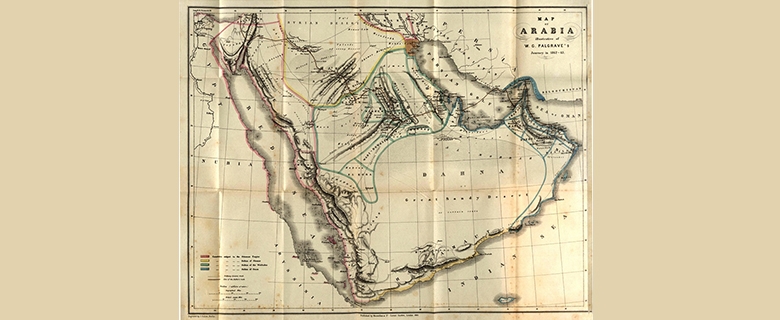
William Gifford Palgrave (1826 – 1888) was a British Jesuit who was the first Westerner to accomplish a sea-to-sea crossing of the Arabian Peninsula. Disguised as a Syrian Christian physician, Palgrave traveled from Syria through present-day Saudi Arabia, Bahrain, Oman and Qatar, publishing his narrative upon his return to Europe.
Despite his attempts to blend in, Palgrave describes his 10 days in Qatar through a distinctly Western lens. He arrived in Al Bidda on 29 January 1862, and his first impressions were less than flattering, referring to it as “the miserable capital of a miserable province.” His descriptions do give some idea of the harshness of life in Qatar at the time:
"To have an idea of Katar, my readers must figure to themselves miles on miles of low barren hills, bleak and sun-scorched, with hardly a single tree to vary their dry monotonous outline: below these, a muddy beach extends for a quarter of a mile seaward in slimy quicksands, bordered by a rim of sludge and seaweed."
From Palgrave we get a description of how Qatari shepherds protected themselves from marauding Bedouin raiders: “[The towers] are small circular buildings from twenty-five to thirty feet in height, each with a door about half-way up the side and a rope hanging out; by this compendious ladder the Katar shepherds, when scared by a sudden attack, clamber up to safety in the interior of the tower, and once there draw the rope after them.”
Pearling, Palgrave noted, was the center of economic activity, a conclusion confirmed by a conversation with Sheikh Mohammed bin Thani, ruler of Qatar at the time. “We are all from the highest to the lowest slaves of one master, Pearl,” Sheikh Mohammed told Palgrave during one of their evening chats.
Sheikh Mohammed— father of the founder of modern Qatar, Sheikh Jassim Al Thani—is described by Palgrave as “renowned for prudence and good-humoured easiness of demeanour,” a leader who “by dint of study … had rendered himself a tolerable proficient in literary and poetical knowledge, and took great pleasure in discussing topics of this nature.”
Learn More
Read Palgrave’s full narrative in our Digital Repository here; chapter 12 tells of his time in Bahrain and Qatar.
Sheikh Jassim’s poetic side is encapsulated in his Treatise on Nabati Poetry, in which Style is the Poetry of Banū Hilāl, on display in the Heritage Library Permanent Exhibition.
To learn more about this oral poetry tradition of Arabia, see Saad Abdullah Sowayan’s Nabati Poetry: The Oral Poetry of Arabia in our Main Collection.

Add new comment